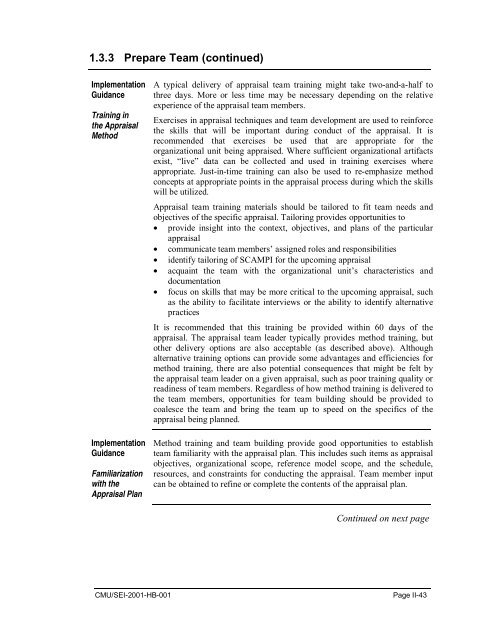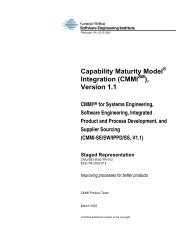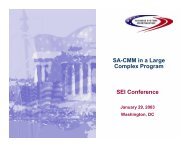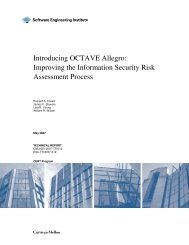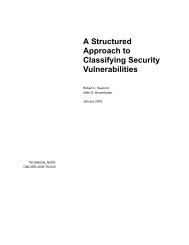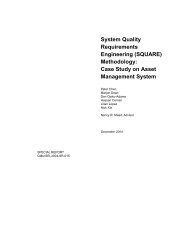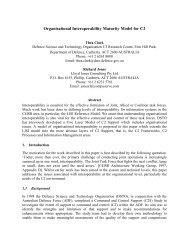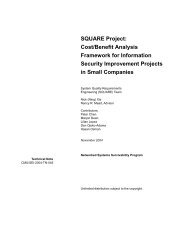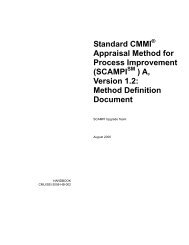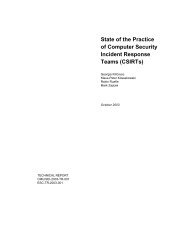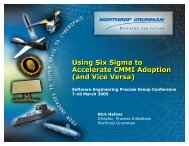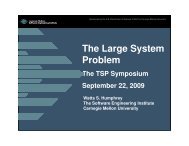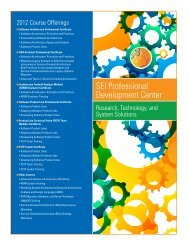Standard CMMI Appraisal Method for Process Improvement (SCAMPI)
Standard CMMI Appraisal Method for Process Improvement (SCAMPI)
Standard CMMI Appraisal Method for Process Improvement (SCAMPI)
Create successful ePaper yourself
Turn your PDF publications into a flip-book with our unique Google optimized e-Paper software.
1.3.3 Prepare Team (continued)<br />
Implementation<br />
Guidance<br />
Training in<br />
the <strong>Appraisal</strong><br />
<strong>Method</strong><br />
Implementation<br />
Guidance<br />
Familiarization<br />
with the<br />
<strong>Appraisal</strong> Plan<br />
A typical delivery of appraisal team training might take two-and-a-half to<br />
three days. More or less time may be necessary depending on the relative<br />
experience of the appraisal team members.<br />
Exercises in appraisal techniques and team development are used to rein<strong>for</strong>ce<br />
the skills that will be important during conduct of the appraisal. It is<br />
recommended that exercises be used that are appropriate <strong>for</strong> the<br />
organizational unit being appraised. Where sufficient organizational artifacts<br />
exist, “live” data can be collected and used in training exercises where<br />
appropriate. Just-in-time training can also be used to re-emphasize method<br />
concepts at appropriate points in the appraisal process during which the skills<br />
will be utilized.<br />
<strong>Appraisal</strong> team training materials should be tailored to fit team needs and<br />
objectives of the specific appraisal. Tailoring provides opportunities to<br />
• provide insight into the context, objectives, and plans of the particular<br />
appraisal<br />
• communicate team members’ assigned roles and responsibilities<br />
• identify tailoring of <strong>SCAMPI</strong> <strong>for</strong> the upcoming appraisal<br />
• acquaint the team with the organizational unit’s characteristics and<br />
documentation<br />
• focus on skills that may be more critical to the upcoming appraisal, such<br />
as the ability to facilitate interviews or the ability to identify alternative<br />
practices<br />
It is recommended that this training be provided within 60 days of the<br />
appraisal. The appraisal team leader typically provides method training, but<br />
other delivery options are also acceptable (as described above). Although<br />
alternative training options can provide some advantages and efficiencies <strong>for</strong><br />
method training, there are also potential consequences that might be felt by<br />
the appraisal team leader on a given appraisal, such as poor training quality or<br />
readiness of team members. Regardless of how method training is delivered to<br />
the team members, opportunities <strong>for</strong> team building should be provided to<br />
coalesce the team and bring the team up to speed on the specifics of the<br />
appraisal being planned.<br />
<strong>Method</strong> training and team building provide good opportunities to establish<br />
team familiarity with the appraisal plan. This includes such items as appraisal<br />
objectives, organizational scope, reference model scope, and the schedule,<br />
resources, and constraints <strong>for</strong> conducting the appraisal. Team member input<br />
can be obtained to refine or complete the contents of the appraisal plan.<br />
Continued on next page<br />
CMU/SEI-2001-HB-001<br />
Page II-43


